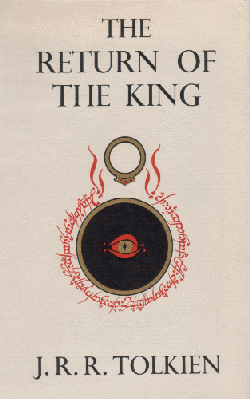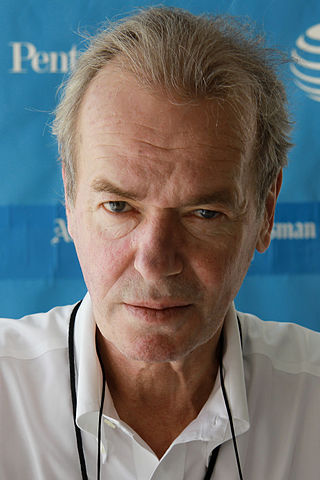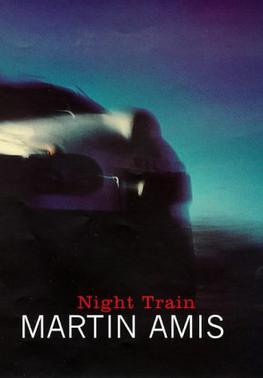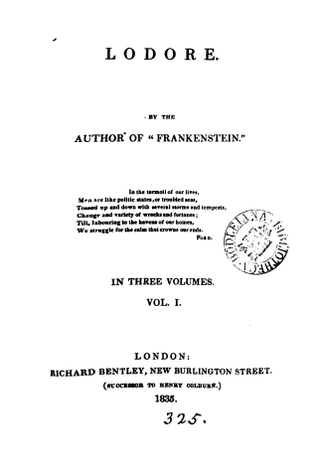
The Return of the King is the third and final volume of J. R. R. Tolkien's The Lord of the Rings, following The Fellowship of the Ring and The Two Towers. It was published in 1955. The story begins in the kingdom of Gondor, which is soon to be attacked by the Dark Lord Sauron.

Sir Martin Louis Amis was an English novelist, essayist, memoirist, screenwriter and critic. He is best known for his novels Money (1984) and London Fields (1989). He received the James Tait Black Memorial Prize for his memoir Experience and was twice listed for the Booker Prize. Amis was a professor of creative writing at the University of Manchester's Centre for New Writing from 2007 until 2011. In 2008, The Times named him one of the 50 greatest British writers since 1945.
The Chronicles of Barsetshire is a series of six novels by English author Anthony Trollope, published between 1855 and 1867. They are set in the fictional English county of Barsetshire and its cathedral town of Barchester. The novels concern the dealings of the clergy and the gentry, and the political, amatory, and social manoeuvrings among them.

London Fields is a blackly comic murder mystery novel by the British writer Martin Amis, published in 1989. The tone gradually shifts from high comedy, interspersed with deep personal introspections, to a dark sense of foreboding and eventually panic at the approach of the deadline, or "horror day", the climactic scene alluded to on the very first page.

Elizabeth Jane Howard, was an English novelist. She wrote 12 novels including the best-selling series TheCazalet Chronicle.

Time's Arrow: or The Nature of the Offence (1991) is a novel by Martin Amis. It was shortlisted for the Booker Prize in 1991. It is notable partly because the events occur in a reverse chronology, with time passing in reverse and the main character becoming younger and younger during the novel.

Sensibility refers to an acute perception of or responsiveness toward something, such as the emotions of another. This concept emerged in eighteenth-century Britain, and was closely associated with studies of sense perception as the means through which knowledge is gathered. It also became associated with sentimental moral philosophy.

Money: A Suicide Note is a 1984 novel by Martin Amis. In 2005, Time included the novel in its "100 best English-language novels from 1923 to the present". The novel is based on Amis's experience as a script writer on the feature film Saturn 3, a Kirk Douglas vehicle. The novel was dramatised by the BBC in 2010.

Night Train (1997) is a comedic parody of American detective novels by the author Martin Amis, named after the song "Night Train", which features twice in the novel.

The Information is a 1995 novel by British writer Martin Amis. The plot involves two forty-year-old novelists, Gwyn Barry (successful) and Richard Tull. Amis has asserted that both characters are based on himself. It is, says Amis, a book about "literary enmity".

The Bookshop is a 1978 novel by the British author Penelope Fitzgerald. It was shortlisted for the Booker Prize. The novel was made into a film by Isabel Coixet in 2017.

Lodore, also published under the title The Beautiful Widow, is the penultimate novel by Romantic novelist Mary Shelley, completed in 1833 and published in 1835.

Yellow Dog is the title of a 2003 novel by the British writer Martin Amis. Like many of Amis's novels, the book is set in contemporary London. The novel contains several strands that appear to be linked, although a complete resolution of the plot is not immediately apparent. An early working title for the novel, according to an interview Amis gave with The Observer Review in September 2002, was Men in Power. Despite some rather harsh criticism, Yellow Dog made the longlist for the Man Booker Prize in 2003.

The Rachel Papers is Martin Amis's first novel, published in 1973 by Jonathan Cape.

Other People: A Mystery Story is a novel by British writer Martin Amis, published in 1981.

Dead Babies is Martin Amis's second novel, published in 1975 by Jonathan Cape. Its first UK and US paperback edition was published under the title Dark Secrets. Amis's second novel—a parody of Agatha Christie's country-house mysteries—takes place over a single weekend at a manor called Appleseed Rectory. In 2000, the book was adapted into a film of the same name, starring Paul Bettany and Olivia Williams. In 2001, BBC critic David Wood wrote "Amis's second novel ranks among his most incendiary with its mordant wit, black comedy, and sense of the violently absurd." It has an epigraph attributed to the Cynic Menippus and the novel has been interpreted as a Menippean satire.

Arguably: Essays is a 2011 book by Christopher Hitchens, comprising 107 essays on a variety of political and cultural topics. These essays were previously published in The Atlantic, City Journal, Foreign Affairs, The Guardian, Newsweek, New Statesman, The New York Times Book Review, Slate, Times Literary Supplement, The Wall Street Journal, The Weekly Standard, The Wilson Quarterly, and Vanity Fair. Arguably also includes introductions that Hitchens wrote for new editions of several classic texts, such as Animal Farm and Our Man in Havana. Critics' reviews of the collection were largely positive.

Alice Crary is an American philosopher who currently holds the positions of University Distinguished Professor at the Graduate Faculty, The New School for Social Research in New York City and Visiting Fellow at Regent's Park College, University of Oxford, U.K..

Lemmons, also known as Gladsmuir and Gladsmuir House, was the home of novelists Kingsley Amis (1922–1995) and Elizabeth Jane Howard (1923–2014) on the south side of Hadley Common, Barnet, on the border of north London and Hertfordshire.

VAS: An Opera in Flatland is a novel by the American author Steve Tomasula with design by Stephen Farrell. It was first published in hardback in 2002, and reissued in paperback in 2004. A special “Cyborg” edition, with an audio CD was published in 2009. The novel adapts several characters and settings from Edwin A. Abbott’s novella Flatland: A Romance of Many Dimensions, first published in 1884. Set at the start of the 21st century when technologies like cloning, transplants, and other body modifications were becoming common, VAS employs a wide range of historical representations of the body from family trees and eugenic charts to visual representations of genetic sequencing. Bound in a cover that resembles human skin, the novel is printed in two colors, one that resembles flesh and one that resembles blood. It explores how definitions of the body and the self both emerge from differing narratives, and tells the story of people searching for a sense of identity in a dawning post-biological future.


















